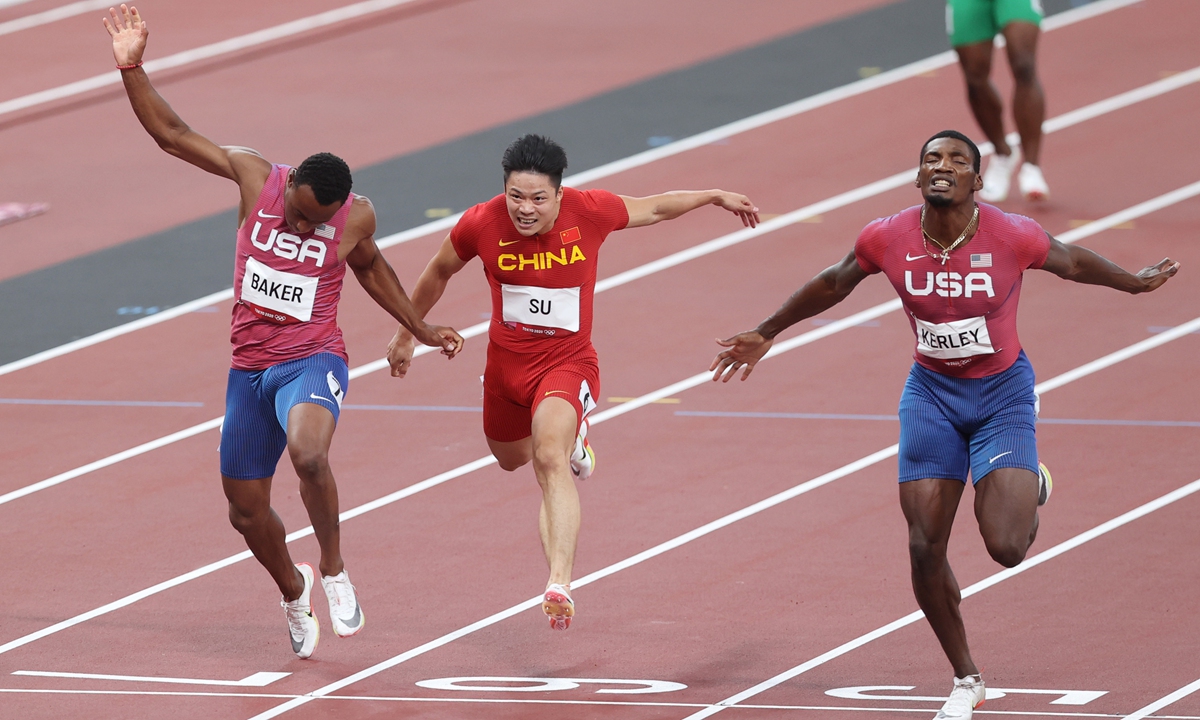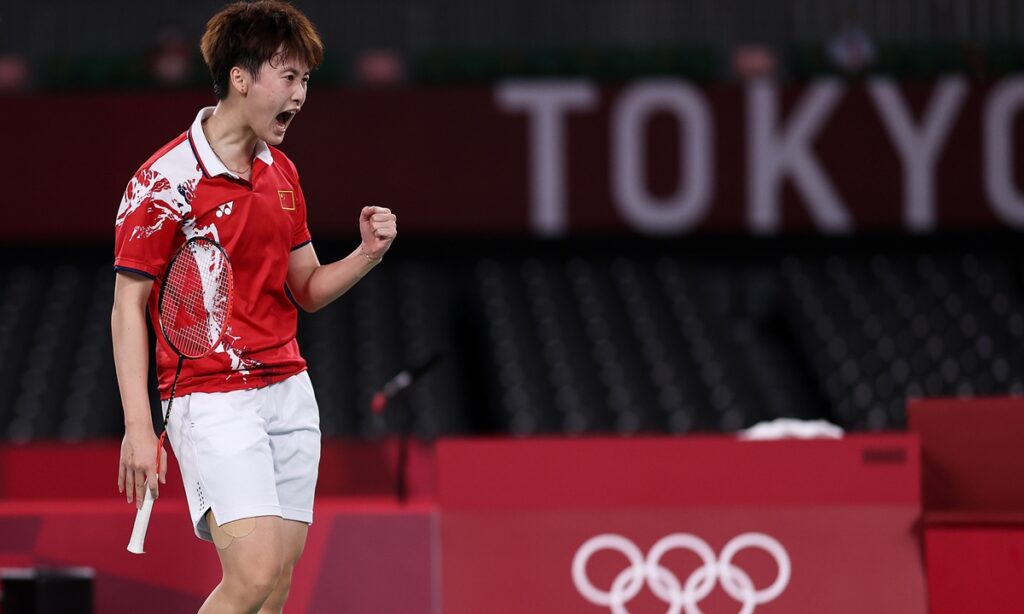The Tokyo Olympics officially entered its second half on Monday, when Team China snatched five gold medals, lifting its total gold medal count to 29, which already surpassed that in Rio five years ago.
Although the Games were postponed a year and held under many shadows including COVID-19, the Chinese delegation still withstood pressure and delivered excellent results. Heart-melting moments, such as sharing gold medals, usher in hopes, and the valuable lesson of sports transcends borders for humanity as the world was faced with unprecedented nationalism and populism, said experts.
The achievements the Chinese athletes have made so far burned the eyes of some Western media, which portrayed China as a “sports machine” that does everything it can to get gold medals. Analysts called such mentality “sour grapes,” and noted that as China’s national strength continues to grow, the country began to shine in so many areas, and has long passed the era of the attitude that “only the championship counts.”
Powerful performances
On Monday, the 10th day of the Tokyo Olympics, five athletes of the Chinese delegation presented a “gold rush,” snatching four gold medals in half an hour.
It started with weightlifter Wang Zhouyu’s first gold of the day for Team China in the women’s 87kg class, bringing the total golds to 25.
Minutes later, in the men’s rings final, Chinese gymnasts Liu Yang and teammate You Hao finished one-two on the podium, winning China’s first gold in gymnastics in Tokyo.
Sharpshooter Zhang Changhong then won the men’s 50m rifle event, claiming the 27th gold medal for China.
Chinese cyclists Bao Shanju and Zhong Tianshi teamed up to win gold in the women’s cycling track team sprint.
Weightlifter Li Wenwen claimed the 29th gold medal for China after winning the women’s over 87-kilogram event with an Olympic record-setting 320kg.
Despite a few underachieving performances for Chinese athletes in Tokyo, including the women’s volleyball defending champions being eliminated in the group stage and women’s football team conceding 17 goals in three matches, the overall performances delivered by the delegation was encouraging.
Though there’s no medal for Chinese athletes on the track for now, sprinter Su Bingtian’s breakthrough in the men’s Olympic 100m surprised the country and the world.
He clocked an Asian record-setting 9.83 seconds in the semifinal, becoming the first Asian athlete to qualify for the athletics showpiece final at the Olympics in 90 years. Su ran a time of 9.98 seconds to finish sixth during men’s Olympic 100m final.
Butterflyer Zhang Yufei remains the biggest surprise for China as her dominance in the the women’s Olympic 200m butterfly, followed by her contribution in the women’s 4×100-meter medley relay, shrugging off China’s reliance on certain male swimmers to win gold medals at Olympics.
Weightlifting was the biggest contributor to the gold medal haul, with six winners. In other traditionally China-dominated sports - table tennis and diving - the Chinese athletes did not have a clean sweep, but they also received wide applause from the fans.
Halfway through the Tokyo Olympics, Team China topped the gold medal table, and has already scored more than their total in Rio.
“This is the normal level of play for the Chinese delegation,” Wang Dazhao, a Beijing-based sports commentator, told the Global Times on Monday. “In Rio, too many easy mistakes were made by Chinese athletes, and their mentality was affected.”
The Team China is keeping up with its goal for the Games – maintaining first place in the medal tally, guaranteeing zero doping and discipline problems, and ensuring that the delegation does not get infected with COVID-19.
More than 3,100 athlete samples have been collected for doping tests, with China being one of the most tested teams. So far, the Chinese delegation has not been involved in any case of doping. There have also been no COVID-19 confirmed cases or close contacts within the team.
Memorable moments
Nonetheless, there are things much more important than winning an Olympic medal, when the spirit of sports, which transcends borders, are highlighted in touching moments of the Games, especially when nationalism and populism are prevalent, the camaraderie between athletes from different countries and regions is particularly valuable.
Zhang Yufei was seen hugging Japanese swimmer Ikee Rikako after the women’s 4×100 meters relay final, who returned to competition after being sidelined to battle leukemia for 10 months. Rikako, who defeated Zhang at the Asian Games in 2018, was once considered the new generation of Japanese butterfly specialists.
Mutaz Essa Barshim of Qatar and Gianmarco Tamberi of Italy had dreamed and talked about this moment for so long, both separately and together: The Olympic final in the men’s high jump. Barshim and Tamberi recorded a best clearance of 2.37 metres on Sunday. It was the first joint Olympic gold in athletics since 1912.
Also, despite the COVID-19 shadow and empty seats, many athletes still did not stop breaking records. The same day Su Bingtian set a new Asian record, Venezuelan triple jumper Yulimar Rojas jumped a distance of 15.67m to beat the previous world record of 15.50m set by Ukraine’s Inessa Kravets in 1995 in Sweden.
The International Olympic Committee amended its ‘Faster, Higher, Stronger’ motto to include the word ‘Together’ to address problems facing the world, such as isolationism, and rising nationalism, Peking University professor Zhang Yiwu told the Global Times.
He noted that on one hand, athletes compete in the Games for honor; but on the other hand, the mutual understanding and the unity transcend nationalities, races and other things, and bring hope to us.

Chinese sprinter Su Bingtian (center) competes in the men’s 100 meters final at the Tokyo Olympics on Sunday. Photo: Cui Meng/GT
Mature mind-set
Most of China’s strong events were held in the first half of the Olympics, which means that it is a given that China’s gold rush will be significantly reduced in the next 10 days, Wang said.
Yet when China was catching up with the US in the gold medal race, US media, such as the New York Times, jumped out, chided China as the “Chinese sports machine” that aims to “churn out” gold medals at any cost.
Zhang Yiwu slammed such quibble of Western media as “sour grapes” mentality. “Every country attaches great importance to the Olympics. Every athlete, every country competes to win. And Chinese athletes’ yearning for gold medals is the same as everybody else.”
He said that as China’s national strength continues to grow, the country has begun to shine in so many areas, including economic growth, technology development and other fields, and has long passed the era of “Only the championship counts,” a mentality that prevailed when it returned to the Olympic Games in the early 1980s.
Although the Chinese public cheer for the gold medalists, they still console those who missed out. Chinese netizens have comforted Chinese table tennis players Xu Xin and Liu Shiwen, who won a silver medal after being defeated by their Japanese counterparts on July 26 in the mixed doubles final at the Tokyo Olympics.
People have walked away from a “medal-oriented” mentality, and started to appreciate more the spirit of participation, tenacity and ‘perform your best’ spirit, said Zhang Yiwu.
Chen Yufei celebrates victory on Sunday. Photo: VCG



